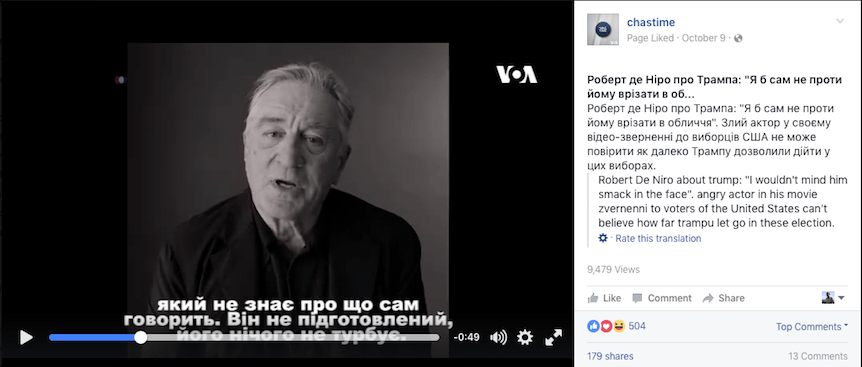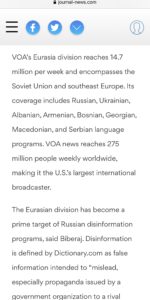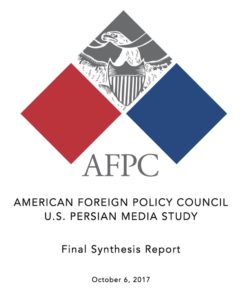OPINION
The Great Numbers Game at U.S. Agency for Global Media
By The Federalist
The U.S. Agency for Global Media or USAGM equates with:
The U.S. Agency for Gross Mismanagement
Or as we like to derisively refer to it as: “U-SAG-M.”
This is an agency that is roiling in characteristics often described as:
✓ Dysfunctional
✓ Defunct
✓ Broken
✓ Leaderless
Its primary mission, codified in the Charter of the Voice of America (VOA) is largely in ruins: it has strayed into the realm of partisan advocacy, of which perhaps the most salient example is this 2016 VOA Ukrainian Service-produced video condoning a physical attack on a U.S.politician, as in “smack him on the face” quote from a Hollywood actor translated into a foreign language without any counter or balance.
The Robert De Niro election propaganda video, re-produced by VOA with Ukrainian subtitles and the VOA logo in the right-upper corner, remained on social media for some time before being taken down by VOA in response to outside protests that it violated the VOA Charter and the VOA Journalistic Code and could have had, a most likely did have, a domestic propaganda impact on U.S. presidential election since it was seen by American voters who read Ukrainian and who could also hear the video’s English audio.
Such brazen partisanship at the Voice of America did not happen before the arrival at the agency in 2015 and 2016 of now former USAGM CEO John F. Lansing (he resigned earlier this years and is now in charge of NPR) and VOA director Amanda Bennett who is still in charge of VOA. Instead of focusing their efforts and attention on Russian aggression against Ukraine and Putin’s Russia’s attempts to interfere with U.S. elections, these VOA broadcasters had decided to interfere with U.S. domestic politics. These VOA foreign language service reporters and editors were not the only ones to engage in such partisanship never before seen at the agency to such a drastic degree. Multiple VOA English newsroom editors and reporters working under Mr. Lansing’s and Ms. Bennett’s joint watch were posting for well over two years insulting and sometimes obscene partisan memes and comments on their personal but publicly accessible social media accounts and in some cases on their VOA work-related social media pages.

In yet another recent major scandal for the USAGM management team, Mr. Lansing’s former top aide and the agency’s chief strategic advisor, Dr. Haroon Ullah, PhD, who had been recruited and brought on board by Mr. Lansing, was recently sentenced by the federal court in Alexandria, VOA for steading tens of thousands of taxpayers’ money while working directly for Mr. Lansing who apparently had no idea that felony crimes were being committed by his senior executive sitting in an office close to his. Mr. Lansing obviously had failed to supervise his assistant and his extensive foreign and domestic travels for which Mr. Ullah falsified travel vouchers and hotel bills. Some of the agency’s other executives having an overall responsibility for audience research were themselves recruited by a man who later became a convicted felon.
The agency’s credibility about anything has been thoroughly damaged by these scandals and every agency claim should be questioned.
USAGM’s legitimate broadcasts to a large degree have only marginal impact or effectiveness at best. Even experts hired by the agency itself concluded in late 2017 that some of its broadcasts to Iran helped to spread propaganda and disinformation from the Iranian Islamic regime.
On December 13, 2019, Mahtab Farid, an Iranian-American journalist, well respected in Washington, DC, where she works as a journalist, posted her critical comments on Facebook, calling the current VOA leadership “corrupt.”
“When I joined U.S. Agency for Global Media – USAGM in 2001, as a young reporter, I was proud that I worked with editors who not only checked the accuracy of the news, they also checked the accuracy on policy and translation. Every news package was precise and backed with respected sources. Unfortunately, the current corrupt leadership at VOA has tarnished and destroyed the most effective public diplomacy tool of the US government in the absence of a diplomatic relation between the US and Iran. Watch this translation and you decide. If we censor the news in the US, how could we criticize the Iranian government?? This is all paid by your tax dollars. My opinions are my own and not the media outlets I work for.”
On November 27, 2019, the same Iranian-American reporter posted another critical comment in response to VOA Director Amanda Bennett’s video criticizing the Iranian government for arresting journalists:
With all due respect Ms. Amanda Bennett, the Persian Service reporters haven’t left their desks for the recent unrest in Iran, so no need to worry. Your poor coverage of the protests in Iran have been beyond embarrassing. Please stop acting as if Persian service did something extraordinary.
However, you would hardly know this to be the case if you read the agency’s propaganda, both internal and external. Of late this would include a November 21, 2019 press release and something of a companion piece authored by former agency official Alan Heil.
The press release claims:
“Unbiased and independent reporting sustains record audiences for USAGM networks.”
In part, the press release claims:
“The USAGM annual impact and performance numbers indicate that its programming reaches continuously larger audiences than ever despite changing media environments worldwide.”
It’s A Numbers Game: Let’s Break It Down
Let’s start with the obvious: this is the agency’s own internal report. In short, you can expect to say anything the agency wants it to say and you can also be certain that it will paint a rosy picture. One of the agency’s longtime top experts in audience research wrote after he retired that the agency has manipulated audience research.
A former analyst for the U.S. Agency for Global Media, which oversees taxpayer-funded broadcast and online media directed at overseas audiences, has publicly challenged the methods used by the agency in making audience size claims.
An audience research analyst for the U.S. Agency for Global Media (formerly the Broadcasting Board of Governors) for many years, Kim Elliott, Ph.D., is the first former official to raise questions about USAGM figures.
His views, published online by the University of Southern California Center for Public Diplomacy blog, also appeared first in a small circulation subscription journal published by NASWA (North American Shortwave Association).
 Voice of America Eurasia Division Director Elez Biberaj was quoted reporting that the weekly audience number for his entire division, including Russia, is only 14.7 million. That number is smaller than what during the Cold War VOA could get in just one or two medium size counties. Russia’s population alone is about 145 million. Ukraine’s population is 42 million. The last weekly audience numbers we have seen for VOA’s and Radio Free Europe/Radio Liberty’s (RFE/RL) premier Current Time Russian-language TV and web channel was 0.8 percent, less than one percent.
Voice of America Eurasia Division Director Elez Biberaj was quoted reporting that the weekly audience number for his entire division, including Russia, is only 14.7 million. That number is smaller than what during the Cold War VOA could get in just one or two medium size counties. Russia’s population alone is about 145 million. Ukraine’s population is 42 million. The last weekly audience numbers we have seen for VOA’s and Radio Free Europe/Radio Liberty’s (RFE/RL) premier Current Time Russian-language TV and web channel was 0.8 percent, less than one percent.
In the ways of Washington bureaucracies, the best cover is to claim impressive performance. To do otherwise would seriously compromise future funding and in some cases (as should be the case with U-SAG-M) the continued existence of the agency itself.
If an agency bureaucrat were to lose complete sense of self-survival and admit (the obvious) that the agency is in disarray, without any impact or mission effectiveness, that person would be quickly relegated to a windowless office in the basement of the Cohen Building and perhaps be “encouraged” to look for employment elsewhere in the Federal government or be advised that it is time to retire.
But you won’t find it here. Instead, the con game is to make generalized and oversized claims of growing audiences when the exact opposite is more likely to be the case and the agency’s impact and effectiveness is practically zilch.
Even if someone were gullible enough to accept the agency’s claims at face value, the salient fact is this:
A worldwide population of 7-BILLION as in 7,000 millions.
The agency lays claim to a global audience around 300-million. Divide this claimed audience among the 45+ language services of the Voice of America (VOA), the language services of Radio Free Europe/Radio Liberty (RFE/RL), the language broadcasts of Radio Free Asia (RFA) and Alhurra broadcasts to the Middle East (MBN) and those 300-million are diluted down to a slow drip, drip, drip.
Even if someone were to hypothetically double the agency’s alleged audience numbers, it would still fall well short of having a commanding presence in international broadcasting.
But we don’t have to think about ever being a remote possibility in the foreseeable future (as in not in our lifetimes).
The fossilized and embedded agency bureaucrats are thus left to concoct a narrative via internal agency “research” that has one purpose and one purpose only:
Preserve An Agency With A Failed Mission
That’s the game, self-preservation: with the primary objective of protecting those big salaries paid to the Cohen Building bureaucracy without regard to a failed mission.
For example:
Supposedly, the agency has placed a high priority on a social media presence. And therein lays a comparative tool against the agency’s claims. What someone would discover is on those (rare) occasions when you see an agency piece on YouTube or Facebook, the number of views or likes are extremely low (hundreds and rarely thousands). Animal videos on YouTube get more views and likes than online political content by the VOA or other agency entities. The agency has been posting a lot of animal videos. It does not help much.
In many ways, one can assert that the agency’s audience claims don’t hold up.
It doesn’t take much to conclude that:
The overwhelming majority of global publics get their news and information from sources other than USAGM.
A Backwater Agency In The Federal Government
The United States Government has many important domestic and international priorities.
USAGM isn’t one of them.
With attention focused on matters of greater importance, the agency is allowed to limp along year after year at taxpayer expense while building upon its negative reputation, layering scandals and mission failures atop one another.
In a Federal budget now in the TRILLIONS of dollars, to spend less than a billion dollars on USAGM is symbolically the equivalent of artificial life support. If the agency were to be cut loose of its Federal funding it is virtually a given that it would fold overnight.
So there it sits, sort of out of sight and out of mind, not worthy of serious time and attention in the form of necessary and detailed oversight by the Executive and Legislative branches of government.
In its current state, it is little more than a liability.
Don Quixote to the Rescue! Brace For Impact!
Hot on the heels of the agency’s press release comes an opinion piece by long-retired agency official Alan Heil:
America’s Best Kept Secret Is A Secret No More. By Alan Heil, Public Diplomacy Council, December 2, 2019.
As someone remarked sarcastically, “Kind of like Don Quixote coming to rescue with the same kind of delusions.”
It would be comical by itself except that it is part of a campaign to deny the existence of or divert attention away from a multitude of scandals, shortcomings and mission failures that have now risen to be a part of a regular narrative about this agency.
Right from the start Heil’s column is nonsensical, claiming in the heading, “America’s best kept secret is a secret no more.”
What…???
A claim that makes the bearer a messenger on a fool’s errand.
This agency is anything but a “secret.” That is a complete crock…just as the agency’s unilateral and unsupported claims of success in whatever way it spins its own internal narrative.
And Mr. Heil should also take into account the agency’s mission:
Public Diplomacy!
An agency with a public diplomacy mission can’t be much of a major factor if it is “secret,” hiding in the shadows.
Perhaps Mr. Heil mistakes “secrecy” for:
✓ Lack of public interest
✓ Indifference
✓ Higher priorities
Invariably when articles arise about the agency, public comments are often in the negative, including questioning why this agency still exists.
So, let’s repeat our view for Mr. Heil’s benefit:
The overwhelming majority of global publics their get news and information from sources other than USAGM.
And that fact alone relegates Mr. Heil’s opinion piece to the fantasy basket. The piece has no more credibility than the U-SAG-M press release itself.
And if this isn’t bad enough…
Last But Not Least
INFORMATION WARS
How We Lost the Global
Battle Against Disinformation
and What We Can Do About It
by Richard Stengel
Atlantic Monthly
357 pp. $28
(Reviewed by James Mann in The Washington Post, Outlook Section, Sunday, December 1, 2019)
Mr. Stengel is a former Under Secretary of State for Public Diplomacy. As reviewer James Mann notes, he held the post for 34 months, making him the longest-serving of the 13 under secretaries who have held the job since it was created in 1999. In the Trump administration four people have been in the post so far, three of them in an acting capacity.
This position is above anyone on the BBG or the USAGM totem pole and which the agency reports to (remembering the agency’s false claim of being “independent”).
The book’s sub-title says it all:
“How We Lost the Global Battle Against Disinformation and What We Can Do About It.”
Scandal And Failure: Permanent Agency Fixtures?
What makes scandal and failure more like permanent fixtures in this agency is the internal climate within the agency itself.
No one relishes being in a position to deliver bad news. What this agency’s leadership wants is “happy” news, the kind you see in its press releases or the fantasy scripts from Mr. Heil.
The first reaction to bad news is often denial, particularly if it involves people in the higher levels of the bureaucracy. That means dealing with the power structure: a power structure that sends an employee to that windowless office in the basement of the Cohen Building.
Then it becomes decision time: to stay silent or to avail oneself of the State Department Office of Inspector General (OIG) hotline to anonymously report issues of possible wrongdoing.
If the report proves to be correct, then one can expect two things:
✓ Claims by agency officials that they had no idea of the wrongdoing taking place.
✓ Claims that there will be zero tolerance in the future.
Both are intended to get the agency out of the spotlight (maybe a version of Alan Heil’s “secret” agency) until the trouble blows over.
But it becomes equally likely a new scandal will replace those previously.
“What We Can Do About It” should not under any circumstances be to buy into the alternative reality coming from Mr. Heil or the agency bureaucrats running around in the Cohen Building.
We’ve said it before and it bears repeating again:
If you want to salvage the agency’s mission and put it on the right track the best thing to do is transfer the agency’s functions elsewhere, eliminate the BBG and most if not all of the USAGM bureaucracy and start with a clean slate.
At the very least, senior agency officials need to be replaced.
And along with that…
To use VOA as an example, the agency has over 45 language services. If the agency can’t have impact and effectiveness with 45+ language services, it’s probably time to think about downsizing.
The only thing adding more language services does is increase the bureaucratic bloat…which actually may be part of the strategy: making the agency “too big to fail” and similarly too big to fix.
The agency has already failed. And since we’ve passed that milestone, perhaps the operative approach should be a Plan B as in “less is more.”
It should also be noted as Mr. Stengel writes in his book,
“The plain truth is that people are going to believe what they want to believe.”
This agency does not have the leadership acumen or the focus to deal with this reality.
Denying this reality, which is ultimately a consequence of the false narrative and numbers game played by agency officials and those who support the status quo, doesn’t get the job done.
The Federalist
December 2019


